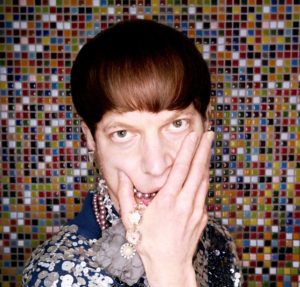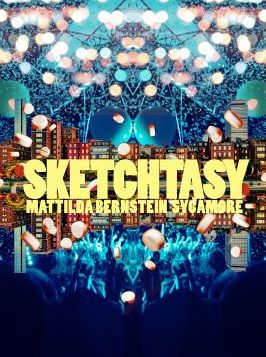 Sketchtasy
Sketchtasy
by Mattilda Bernstein Sycamore
Arsenal Pulp Press. 256 pages, $17.95
NOSTALGIA for the ’90s seems to be in the air. Troye Sivan and Charli XCX have a pop hit with their song “1999,” while the protagonist of Andrea Lawlor’s 2017 novel Paul Takes the Form of a Mortal Girl is an omnisexual shape-shifter sleeping his way across 1990s America. Not all the 90s nostalgia is lighthearted, though. Ryan Murphy’s TV show The Assassination of Gianni Versace focused on AIDS and the oppression of the closet as much as it did on fashion, while two gay men are stalked by murderers at a gay cruising area in The Devil’s Path, a horror film shown at film festivals in 2018. Maybe the 1990s weren’t so great after all?
Both the highs and the lows of that decade are featured in Sketchtasy, Mattilda Bernstein Sycamore’s third novel. The narrator is Alexa, a college-age genderqueer person living in Boston in the 1990s. The term “genderqueer” wasn’t used at the time (and isn’t in the novel), and it’s interesting to read how Alexa and her friends try to navigate gay male culture at a time when there were fewer categories available to describe gender. At night they don outrageous club-kid drag, dance at the gay bars, and refer to each other almost exclusively with female pronouns. During the day they dress in traditional male clothing for their boring jobs, though Alexa, calling herself Tyler, earns money as a butch hustler servicing older gay men.
Alexa and friends also take drugs. Ecstasy, ketamine, marijuana, Xanax, cocaine, and many others are consumed in large quantities. Although the characters tell themselves they are using drugs solely for entertainment, it’s clear they’re also self-medicating to cope with a homophobic environment, sexual abuse, and the AIDS epidemic.

Some readers might find the frequent and lengthy descriptions of drug use off-putting, but Sketchtasy offers some compelling insights into queer culture. One of them is how LGBT people share culture and educate each other. Alexa and her friends share music and DJ mixes. As Tyler, she reads the works of David Wojnarowicz with Nate, an older wealthy trick. Another trick plays Alexa his favorite operas. Alexa introduces a group of recovering alcoholics to Todd Haynes’s film Poison, and in turn they show her Breakfast at Tiffany’s. Sketchtasy, with its detailed and well-researched descriptions of gay life in Boston twenty years ago, is itself educational, showing younger readers what the city was like before the Internet ruined gay night life.
The novel also explores the ways in which LGBT people successfully and unsuccessfully nurture one another. Alexa’s friends give her the nickname “Mother One,” but her mothering often takes the form of feeding their addictions with drugs and alcohol. She also opens her apartment to Joanna, a recovering junkie, but can’t see how her own behavior jeopardizes Joanna’s recovery. As Alexa’s friends disappear from her life because of addiction and AIDS, she relies more on Nate for emotional and financial support, despite finding him physically repellent. Their relationship is a mercenary one, but Nate allows Tyler/Alexa to live in his house and encourages her to get help with her addiction. Together they read Rebecca Brown’s 1994 novel The Gifts of the Body, which is about a nurse caring for people with AIDS.
Throughout the novel, Alexa frequently mocks Boston’s bourgeois gays as boring, but she ultimately finds the unconditional support she needs in a gay AA group. She thinks to herself during one AA meeting: “Yes this is cheesy, but all these gay men in a room, speaking to one another. … I’m wondering if I’ve ever been in a room full of gay men who are trying to take care of one another.” Sketchtasy ends ambiguously, but not without some hope that Alexa will find ways to live creatively but safely in a harsh world.
Peter Muise writes about New England folklore and legends.





